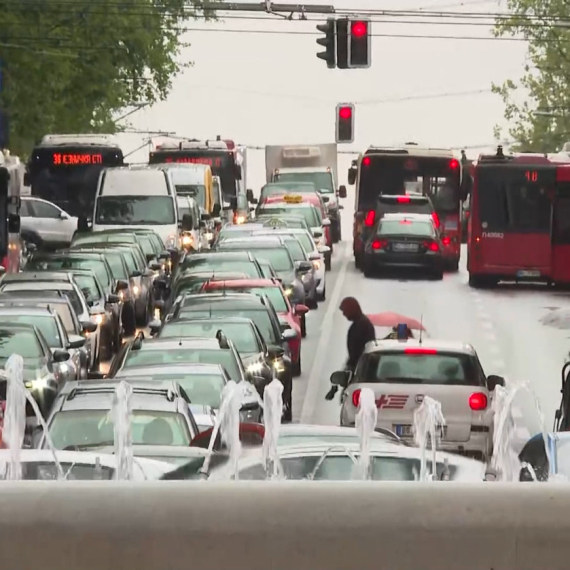Commissioner barred from speaking "by mistake"
Representatives of independent regulatory bodies walked out of a parliament session late on Wednesday after Rodoljub Šabić was not allowed to speak.
Thursday, 05.06.2014.
10:07

Commissioner barred from speaking "by mistake"
The commissioner said he did not know whether this was a case of "ignorance or malice," and pointed out that before the incident, all representatives of regulatory bodies had a chance to speak, and that he himself addressed MPs.The agenda of the session was to consider reports filed by independent regulatory bodies, detailing their work during 2013.
Šabić also accused Speaker Maja Gojković of allowing SNS deputy Marjan Rističević to "brutally insult" Ombudsman Saša Janković and Commissioner for Equality Nevena Petrušić, who also attended the session.
Later in the day, the Serbian parliament announced that the incident was the result of "an omission":
"The National Assembly regrets the fact that because of a serious omission of Deputy Speaker Vadimir Marinković all participants in a special session were not allowed to address the National Assembly, even though they had the right to do so," a statement said.
The Serbian parliament expressed hope that "despite these developments, the participants of the session would respond to the invitation to use their right under the Rules of Procedure of the National Assembly," as the meeting continues on Thursday.
Speaker Maja Gojković also apologized for the incident, noting that she was not presiding over the session at the time, and that parliament would "declare itself about the violations of the Rules of Procedure."
The reports
In his report covering 2013, Rodoljub Šabić wrote that citizens obtain information from government bodies at all levels, but that the situation regarding the personal data protection gives a cause for concern.Most problems concerning free access to information occurred in the state-owned or public enterprises, he added.
The commissioner also said that over 93 percent of those who were denied a piece of information of public importance got it after the commissioner's intervention.
However, he noted that after the adoption of the personal data protection law, not a single bill regulating this field has been passed.
"That is a lengthy process; in that field, we have done practically nothing," Šabić underlined, adding that the commissioner has no power to propose laws.
To illustrate this argument, Šabić warned that there are no laws on video surveillance, security checks, biometrics, adding that an initiative for passing a new law on personal data protection will be launched.
There are citizens in Serbia whose civil rights have been seriously violated, but despite the protector of citizens giving a warning about this situation, nothing has been done to have it corrected, Serbia’s Ombudsman Saša Janković says in his 2013 report.
Presenting before MPs the report he submitted to the Serbian parliament on Wednesday, Janković spoke about failures by public enterprises, the Serbian government, the Tax Administration, the media, inspection services, failure to take measures against domestic violence, and pointed to the Roma as still the most vulnerable minority community.
“If the Ministry of Defense is carrying out the recommendations and redressing the oversights that I established 100 percent, and MUP (the Interior Ministry) and the Security Information Agency are doing it almost as much, you should know that zero public enterprises are doing the same,” Janković said in parliament.
Speaking about administrations within ministries, the protector of citizens said that the Tax Administration was behaving like “a state within a state,” pointing to earnings by women in pregnancy, which, by rule, were arriving late, as an example.
Turning to weaknesses of the judiciary, the Ombudsman said that the court fees were still too high and that the law on free legal aid had not yet been enacted.
When it comes to media manipulation, Janković said that media tabloidization, which he had pointed to in his 2012 report, had become even more harmful to society over the previous year.
“Facts, evidence and investigations that should be hidden are always pushed out through the same media, including half-truths and sometimes outright lies ... decisions on these matters are no longer made by competent bodies,” Janković said, stressing that it undermines the rule of law and rights guaranteed to citizens by law.
The protectors of citizens was also speaking to lawmakers about the situation in Serbia concerning the rights of the child, life of people with disabilities, rights of national minorities and education in minority languages.
Commissioner for the Protection of Equality Nevena Petrušić has said on Wednesday that steps forward were made in the protection against discrimination, but that the situation in that field is still not satisfactory, and that much work still lies ahead of the country when it comes to building a tolerant society.
Presenting a report on the commissioner's work in the previous year to the Serbian parliament, Petrušić said that the discrimination against the Roma community is the most widespread in Serbia, being both structural and institutional, but that other types of discrimination were also noted.
The discrimination on the grounds of gender and disability is also present, and the discrimination against the LGBT community is widespread, she said.
"Discrimination is happening in all fields of social life," Petrušić said, noting that she often gets complaints from citizens over the discrimination concerning their work and labor relations, as in such cases people are more motivated to seek protection.
She said that over a third of complaints relate to public bodies and their competences.
"Public officials at all levels do not know the law enough, and one fifth of them do not now that the discrimination is forbidden by the law," Petrušić noted.
The commissioner said that the number of complaints has been growing year by year, so last year 716 proceedings were instituted in response to the complaints.
The commissioner's office delivered 24 recommendations of measures and filed three claims and pressed offense charges in two cases.
Among the received complaints, most cited the health status, nationality or ethnicity, age, disability, marital status or gender as the reason for discrimination.
Petrušić said that individuals accounted for the largest number of complaints, while 20 percent of the total number of complaints came from the non-governmental sector.


























































Komentari 0